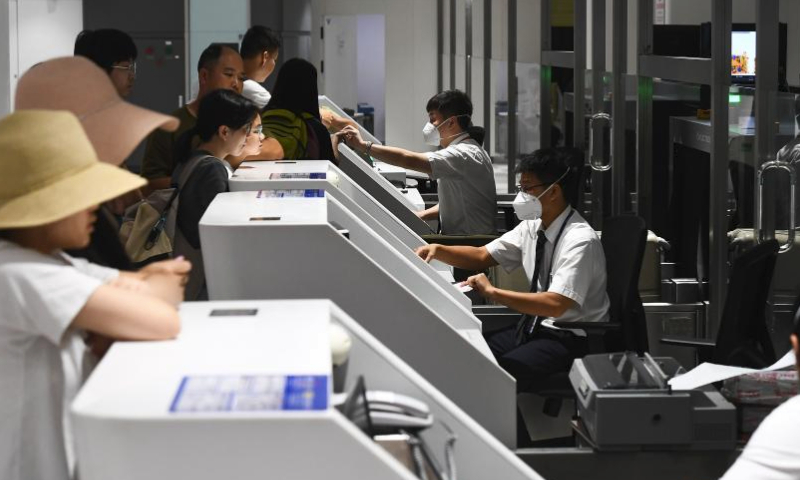China's entries, exits exceed 141 million in Q1, a year-on-year increase of 117.8%: NIA

Photo: Xinhua
The National Immigration Administration (NIA) announced at a press conference on Thursday that in the first quarter, immigration management agencies nationwide processed over 141 million traveler trips, a year-on-year increase of 117.8 percent.
Among them, trips by residents from the Chinese mainland reached 69.5 million, while trips by residents of the Hong Kong and Macao special administrative regions and the island of Taiwan reached 59.1 million, year-on-year increases of 114.9 percent and 100.4 percent, respectively. Those by foreign nationals reached 13.1 million, a year-on-year increase of 305.2 percent.
In the first quarter, the NIA introduced a series of immigration and entry-exit management policy measures, including continuously optimizing regional visa-free entry, visa-free transit, and port visa policies, implementing five measures to facilitate foreigners visiting China. This expanded the options for visa-free entry for nationals of certain countries to South China's Hainan Province, supporting East China's Fujian Province in building a cross-Straits integration development demonstration zone. It also issued individual tourist endorsements for travel to and from Hong Kong and Macao for eligible individuals in Xi'an in Northwest China's Shaanxi Province and Qingdao in East China's Shandong Province.
According to an immigration administration spokesperson, the number of foreigners arriving in China in the first quarter increased more than threefold compared to the same period in 2023.
The countries with the most residents coming to China included US, Australia, Canada, Germany and the UK. Other visitors included residents from neighboring countries such as Russia, Vietnam, Myanmar, Mongolia, Laos, as well as East Asian and Southeast Asian countries such as South Korea, Japan, Malaysia, Singapore and Thailand.
Foreigners were mainly visiting for tourism, accounting for over 30 percent of arrivals, followed by business, visiting relatives and friends, work, and study.
After gradually relaxing entry restrictions in the country, the number of foreign groups inquiring about inbound tourism has been steadily increasing, according to the manager of Love Fan International Travel Agency based in Wuhan, Central China's Hubei Province, on Thursday. "Now, we can receive inquiries from more than thirty groups in a day. The main countries of these groups include Thailand, Singapore, the UK and some European countries."
According to the manager, the most popular cities and provinces for inbound tourism include Zibo, Chengdu, Yunnan, Xinjiang, and Tianshui which has recently become a popular tourist destination, with its many travel videos online receiving a high volume of comments about the city.
"The changes in entry policies and the convenience of visas have given us more confidence and opportunities in the international tourism sector. From what we understand, a big boom will come in the second half of this year," she noted.
On July 26, 2023, China resumed the 15-day visa-free policy for ordinary passport holders from Singapore and Brunei for business, tourism, visiting relatives, and transit. Later, on December 1, 2023, and March 14, 2024, China successively implemented unilateral visa-free policies for ordinary passport holders from France, Germany, Italy, the Netherlands, Spain, Malaysia, Switzerland, Ireland, Hungary, Austria, Belgium and Luxembourg. The China-Thailand visa exemption agreement officially took effect on March 1, 2024.
To date, a total of 989,000 foreign nationals from the above-mentioned 15 countries have entered China visa-free, showing an overall upward trend.
A netizen from Thailand traveled to Beijing, and shared his story with the Global Times on Thursday. He said he was very excited after watching some YouTubers queuing for spicy hot pot in Tianshui, so he joined a tour group to come to China.
His first stop was Chengdu, where he visited the must-see giant pandas. Then he followed the group to Tianshui, although he didn't get to try the most popular restaurant as seen online, the taste of the food there was memorable enough for him.
For the last stop, he arrived in Beijing and saw the bustling capital of China. He plans to bring his family back for another trip in the second half of the year. "China has a huge variety of delicious dishes and breathtaking scenery. I hope my family will love it here too," he said.
On January 11, the NIA introduced five measures to facilitate foreign nationals coming to China, further relaxing the conditions for foreign nationals applying for port visas in China. The NIA also implemented 24-hour transit without border inspection procedures, providing foreign nationals with convenient visa extension, replacement, reissuance, and re-entry visa application services, simplifying the application materials for foreign nationals applying for visas in China, and strengthening the promotion and implementation of policy measures.
Since the implementation of the policy, a total of 211,000 foreign nationals have entered China through port visa applications; a total of 253,000 foreign nationals in China have applied for visa extension, replacement, reissuance, and residence permits, making it more convenient for foreign nationals to come to and stay in China, and the immigration management agencies have provided more efficient management and services for foreign nationals in China.
"During my trip, I was truly impressed by the warmth and efficiency of China's policies aimed at making travel easier for foreigners," said David, a Serbian traveler who just wrapped up his trip in Beijing in late March. "From transportation to payment methods, everything was designed to make our experience seamless," he told the Global Times on Thursday.
He highlighted the convenience of using apps to book taxis and make payments on his phone, which eliminated the need to constantly withdraw cash from the bank and also alleviated concerns about losing money. "The shopping payment system in China is incredibly convenient, something I never would have imagined before my trip," he said.
The People's Bank of China, Ministry of Commerce, and State Administration of Foreign Exchange have introduced new policy measures aimed at facilitating easier payment for foreign visitors.
The notice, issued on Wednesday, comes in response to the growing demand for diverse payment services in the commercial sector, aligning with the country's ongoing efforts to enhance high-quality engagement with the global community.
With a focus on improving payment convenience for various groups, mainly foreign visitors and the elderly, the notice targets key areas such as bank card acceptance, cash payments, mobile payments, account services and publicity efforts.
Additionally, in the first quarter of this year, national immigration management agencies investigated over 10,000 cases of crimes that obstructed immigration management, apprehended over 14,000 criminal suspects, of which over 12,000 were subjected to criminal coercive measures, with 1,785 handled through administrative measures. A total of 213 criminal gangs were investigated, 53 transit points were dismantled, and 377 vessels involved in criminal cases were seized.
Officials reported that 200 drug cases involving 256 individuals were investigated, including 38 cases involving over 10,000 grams of illicit substances, with a total seizure of 2.5 tons of various drugs and 135.6 tons of drug-making materials. 265 firearms were seized, and the value of smuggled goods intercepted amounted to 1.1 billion yuan ($150 million), the administration announced.


